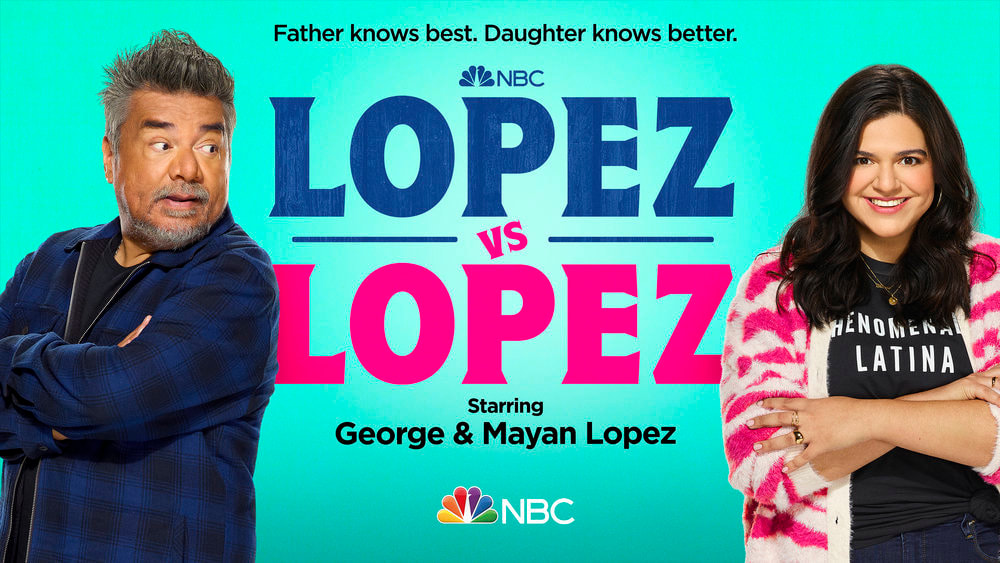 LOPEZ VS LOPEZ -- Pictured: "Lopez vs Lopez" Key Art -- (Photo by: NBC) LOPEZ VS LOPEZ -- Pictured: "Lopez vs Lopez" Key Art -- (Photo by: NBC) Debby Wolfe is a highly accomplished writer and producer, who has worked on some important projects, such as the revival of One Day at a Time and Primo. Currently, she is the showrunner of the hit NBC series, Lopez vs Lopez, and we recently had to the chance to discuss her work on this important series at the Austin Film Festival. John Betancourt: I would love to know what went into the decision to create a comedy that is both Latin-X educational, since there's so much subtext for that, but also just wonderfully hilarious. Debby Wolfe: Well, I am the daughter of a Salvadorian, immigrant mother and a Jewish father, grew up with an identity crisis, like navigating two worlds. (Laughter) But something that I felt was lacking from a very early age was Latin-A representation on television. So as a writer, that's always been very important to me, everything I write, is with casting Latin-A talent in mind. And so, I was very thankful when this opportunity for the show came about and you know, our cast, we are the only network comedy that has a predominately Latin-A cast. That's, it's sad, but like I'm but I'm actually very glad that we're able to do that and continue it, we have a second season. So, we'll be able to continue to do that. John Betancourt: With that in mind, so obviously, we are finally seeing better representation of Latin-x, Latin-A individuals on television. At last, why do you think now is the right time to start seeing so many of these shows that accomplish that? Debby Wolfe: I mean, we're like 19% of the population in the United States, and we're 2% on television. And so, it doesn't line up. But it's taken some time, I think, for Latin-A talent to rise through the ranks. And as we get into these power positions, like, I think it's really important that we hire our people, and train our people, so that they, you know, we can plant seeds, and they can grow, and they can create their own content and do the same thing. So, we're just planting seeds, right now. So that, you know, there's a future where the representation on screen matches what it is in the in the population. John Betancourt: In keeping with that, what does it mean to you to be shepherding this this revolution on television? Debby Wolfe: I mean, I feel like a revolutionary! (Laughter from Debby and John) I mean, it's very… there's definitely a lot of pressure, as we're the only. But I try not to let that get to me and I just, you know, try to focus on telling a story that is, at its core, very grounded and about human emotion and about the human experience. And, you know, in the room like we, we take stories from George and Mayan’s life, but we also take stories from you know, our own lives. And we always start from a place of truth, we’re truth tellers I like to say, and, and that usually is what will resonate with an audience and hopefully, you know, keep us on the air for many seasons. John Betancourt: Yes, many seasons, please. So, without spoiling anything, what are you excited to get to work on in season two? Debby Wolfe: I think you're gonna see a sober George in season two. In the finale, he got sober through the help of his sponsor, Calvin, played by Snoop Dogg, so hopefully, we'll be seeing his sponsor again. And just like, you know, watching George, a newfound sober George, who's very judgmental of everyone now that he's sober! (Laughter form Debby and John) He's the one pointing out everyone else's faults. So, very excited to explore that. John Betancourt: question that I have for you today. What are you most proud of when it comes to Lopez vs Lopez? Debby Wolfe: So, George, and Mayan didn't… this show is based on their real life. They didn't speak for many years, and then they started talking in the pandemic, and then the show has only brought them closer together. So, it's very healing for, you know, we're watching them heal on screen, like they're having conversations on screen that they haven't had in real life that they need to. And so, it's very powerful. And so, we're watching their healing happening right before our eyes and what that does is it generates healing outside of them. So, it's like the show is like, I feel bigger than us. Like, it's just like it's opening up conversations in family’s homes like about, you know, reconnection and, and forgiveness and I think that's what I'm most proud of. This interview has been lightly edited, and condensed for clarity.
0 Comments
Leave a Reply. |
Archives
December 2024
|
|
© 2012-2025, Nerds That Geek LLC.
All Rights Reserved. |
uWeb Hosting by FatCow

 RSS Feed
RSS Feed